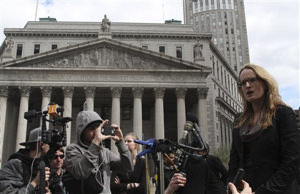Judge Blocks Portion of NDAA
A federal judge Wednesday issued an injunction against a National Defense Authorization Act provision that grants the military the right to detain anyone it suspects of involvement in terrorism US District Judge Katherine Forrest ruled in favor of a group of plaintiffs, including Truthdig columnist Chris Hedges, who filed a lawsuit against the legislation within weeks of President Obama signing it.
A federal judge Wednesday issued an injunction against a National Defense Authorization Act provision that grants the military the right to detain anyone it suspects of involvement in terrorism. U.S. District Judge Katherine Forrest ruled in favor of a group of plaintiffs, including Truthdig columnist Chris Hedges, who filed a lawsuit against the legislation within weeks of President Obama signing it.
Hedges was joined in the suit by linguist, author and dissident Noam Chomsky, Pentagon whistle-blower Daniel Ellsberg and other high-profile activists, scholars and politicians.
Hedges argued in his testimony that his work as a journalist would bring him into contact with terrorist organizations that would, given the scope of the law, qualify him for indefinite detention. The plaintiffs argued that the threat of detention alone would be an unconstitutional encroachment on their First Amendment rights to free expression and association, as well as a violation of the Fifth Amendment right to due process.
Government lawyers and Obama had previously said the provision merely reaffirmed an existing law recognizing the military’s right to perform certain routine duties. Forrest found language in the NDAA regarding the treatment of suspected terrorists to be vague, and that contrary to the government’s claims of redundancy it expanded military powers. –ARK
Your support matters…Courthouse News Service:
Signed by President Barack Obama on New Year’s Eve, the 565-page NDAA contains a short paragraph, in statute 1021, letting the military detain anyone it suspects “substantially supported” al-Qaida, the Taliban or “associated forces.” The indefinite detention would supposedly last until “the end of hostilities.”?
In a 68-page ruling blocking this statute, U.S. District Judge Katherine Forrest agreed that the statute failed to “pass constitutional muster” because its broad language could be used to quash political dissent.?
“There is a strong public interest in protecting rights guaranteed by the First Amendment,” Forrest wrote. “There is also a strong public interest in ensuring that due process rights guaranteed by the Fifth Amendment are protected by ensuring that ordinary citizens are able to understand the scope of conduct that could subject them to indefinite military detention.”
Independent journalism is under threat and overshadowed by heavily funded mainstream media.
You can help level the playing field. Become a member.
Your tax-deductible contribution keeps us digging beneath the headlines to give you thought-provoking, investigative reporting and analysis that unearths what's really happening- without compromise.
Give today to support our courageous, independent journalists.
You need to be a supporter to comment.
There are currently no responses to this article.
Be the first to respond.